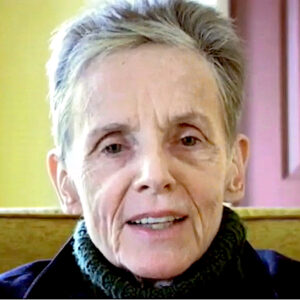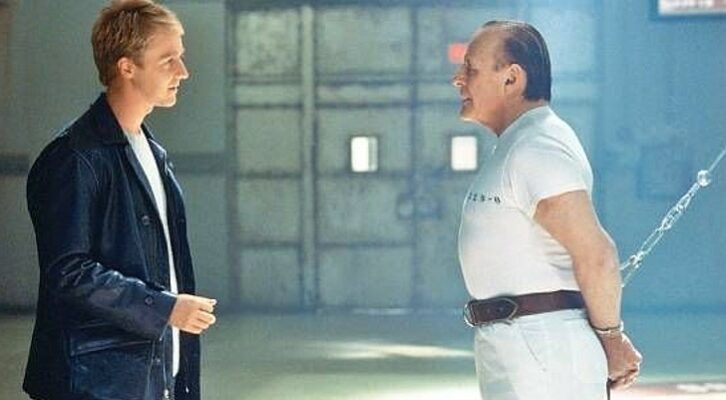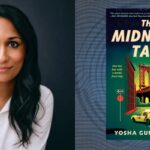
The Inherited Imagination
Sammi LaBue on Family Stories and Hidden Histories
The day my grandfather died, I found a piece of dark green sea glass on the beach. A Maine beach, cold and rocky, like none he had ever seen before, or at least that’s what I have to imagine, because imagining is mostly what I can do when it comes to him. He’d been sick, and even though nearly 80 years of alcoholism, combined with blindness and diabetes couldn’t bring him down, COVID did.
When Mom texts she says, “Joe passed away at 10:40 today.” Joe, a more generous moniker than the usual nicknames we’ve given him. That may sound cold, but when someone has been the source of darkness in your family for as long as he’s lived, family jokes, no matter how unfunny, are the way you make it through without buckling to the weight of shame. Of your legacy being tainted by meanness. Evilness, even.
I know so little about the neutral parts of him (where he lived, what he did) that aren’t muddled by his cruelty. What do I know? I know about his hair, thick for an old man and dyed a chalky black in an attempt to imitate the glossy hair he had when he was young. (This I know from the one picture I have of him, a shot taken during the Korean War—him in uniform, smiling, his eyes closed). I know, even without sight, he was vain.
One time, while my mom sat with my dad and sister on his couch, wringing her hands out nervously, he took me to his balcony to the light so he could see me—the shadows of me, the perimeters—and he proclaimed I was beautiful. I was ashamed to feel pleased by his assessment. If he gave us anything it was shame. My family has always skimmed past the subject of his existence, because it’s distressing to explain, and because familial trauma can sometimes feel like a moral failing. He gave us his story and badness to keep like a secret. He was Chicano, but gave us little pride in our Mexican heritage, as he himself was always ashamed by it. But his hatred wasn’t reserved for his own people; he hated women and tall men and short men and weak men and strong men and brown men and black men and white men and most of all himself.
For some, for me, writing fiction usually comes with a dose of self-reproach, and this is good, to have a moral compass, something in the back of your head that asks, “Is this my story to tell?” I think my capacity to imagine trauma sometimes disturbs people, as I often write about struggles greater than my own. Emotionally destroyed fathers, addiction, abuse. Why do I think I can write about a wicked father when I never was one and never had one?
One of my clearest memories of time with my grandfather was one of the last times my mother could stand to see him.
Because my own father died when I was 15, editors, teachers, peers expect me to write about absent fathers. Because I grew up in suburban Colorado, they expect me to write about the suburbs. But no matter how much I try to shift away from writing the brown experience, the inner-city experience, the experience of physical abuse, my pen tends to take me there. Interesting, funny, writable things happen all the time in my life, but no matter how many times someone says, “you should write about that,” I never seem to exhaust the other material. About the abandoned daughter. The morally corrupt father. The abused and used mother.
On several occasions I have ended up writing fiction that details particularly brutal moments from my mother’s, grandmother’s, and even great-grandmother’s lives, without ever having heard about them first. Later, Mom will tell me, over a glass of wine in my kitchen or hers, in a whisper, another installment of his deeds. The embarrassment envelops her, and the words come slowly, painfully, through tight lips: “He prostituted my mother.” We cry, and I comfort her, thinking back on a chapter I’d written years ago, not so unlike the scene she describes, and I wonder if I stole the story from her, or rather, if I’ve been infected with it all my life.
One of my writing mentors tells me a story shouldn’t ever have too many coincidences but mine is riddled with them. The evening before that same morning of the text, the sea glass, my husband opened a dog-eared page from the Tom Robbins book he’d been reading:
Along their migratory routes, monarch butterflies stay nights in certain trees… But, and this is what is interesting, they are always the same trees. Year after year, whether moving south or returning north monarchs will paper with their myriad wings at twilight a single tree that has served as a monarch motel a thousand times before.
Memory? If so it is genetic. For you see, the butterflies who journey south are not the ones who come back. Monarchs lay their eggs in the sunny climes. Then they die. The hordes who flutter northward in spring are a succeeding generation. Yet, without hesitation, they roost in the same trees as did their ancestors… A butterfly always knows when it is there.
I am not proud of my grandfather, but I don’t intend to live in the shadows of the shame he made himself. Like the butterflies, my instincts are always taking me back to my relatives and ancestors, often the worst of them. Never meaning to write it straight, I subconsciously try to rewrite them as if they could learn to become… if not benevolent, at least human. Redeemed.
The coincidences run deeper. Last year on the phone with my mom I told her about the beginnings of my new project in one breath, talking so quickly she couldn’t get a word in edgewise. She listened patiently. I had just jotted down notes that morning that seemed to wrangle together the loose point I was aiming toward with a new novel manuscript. Forced child marriage said one corner. Then ages: she’s 14, he’s 30. Places. Texas?
The words before me, my mother asked slowly, “Did I ever tell you about my grandma Josephina?” Josephina was a child when my great grandfather went to procure her from Mexico, a wife for the family he already had. There was a rumor that she had been the one to end his life. Mom tells me this with a glint of pride, and I smile too, but I’m dizzy. When he dies she’s suspect number one, my notes say. It’s a story I’ve made up, that my great grandmother already lived.
*
I like sea glass, and I like how, as the part of a whole, a piece always reminds me of where it comes from. Bottles. Once full of alcohol, most likely. That day, with my new piece of sea glass, I wondered what kind of bottle it came from. I wondered if any of my grandfather’s thousands of bottles ever became sea glass.
I’ve always known about the darkness my mother endured along with her mother, sister, and brother, but in pieces. She didn’t talk about it much until later in life, and still I seem to learn something new each time we see each other, each memory more terrifically brutal than the last.
In my experience, grief throws you forward and trauma hurls you back.
Before I knew any of it, I was a kid growing up in Colorado, playing among the pines and in the bone-dry soil, with a tendency toward empathy and a wild imagination for a life of suffering. My favorite game was called “Olden Days,” where my neighbor and I would wear my mom’s long skirts from the 80s and play orphans, toiling in the backyard, a depressing round of make believe.
Even though I didn’t know the particulars of what happened down my family line until recently, Mom taught me the language of grief and trauma before I even understood those terms—she gave me a vocabulary with which to write about trauma just by embodying it.
Among my writing projects now is actually my mother’s story. She wants to write a memoir, and I try to coach her through it. Her story should be heard, and during quarantine we’ve each tried to pick up steam with our writing work. In this quiet hour of isolation and imagination, I have been asked to sit with the idea of generational trauma, hearing more stories of my mother’s life and writing my own book about the child bride.
In the weeks before her father dies, I tell my mom about my growing theory that there is something in me that knows these stories before she tells them to me. She says that funny enough she is reading something on just that same idea. She and my stepdad have been reading Mark Wolynn’s book, It Didn’t Start With You: How Inherited Family Trauma Shapes Who We Are and How to End the Cycle, to each other in the evenings. She tells me sometimes she closes her eyes as he reads in his particular Indiana drawl, picking up each word he unfurls with no certain urgency. I can imagine her, small on their massive couch, her lips pursed the way they do when she is concentrating, trying to stay there, rather than slipping away into the past and all those burdens endured before us.
In the beginning of the book, Wolynn explains the basics of PTSD, saying of traumatic events that “fragments of memory, dispersed as images, body sensations, and words are stored in our unconscious… once they are triggered, it is as if an invisible rewind button has been pressed, causing us to reenact aspects of the original trauma in our day to day lives.” He goes on to tell of this occurring in people up to three generations past the original traumatic event. He writes of a man who can’t sleep for a fear of dying, who describes a feeling of rigid coldness when he tries to shut his eyes. After much suffering, the afflicted man finds out his uncle froze to death in his car. And of a woman with suicidal tendencies who wishes specifically to evaporate, who it turns out has a grandmother whose entire immediate family was gassed at Auschwitz after she immigrated to the US, something the woman never knew.
When I read the book, I only see more clearly what my subconscious mind has been up to all along. Like sea glass on the beach, these memories that aren’t mine wash up on the shore of my imagination, to be written about. My grandfather didn’t give us the beauty of the sea glass or even the whole bottle, but he gave us the opportunity to make the shard into art.
Through my writing workshop business I lead, among other courses, trauma writing sessions, and I often tell my students that it’s not so much what is endured that hurts us, but the silence we’re meant to keep that manifests into greater health issues. The remembered trauma is often more acute if we’re unable to speak the problem aloud. As stated in Wolynn’s book, “traumatic reenactment, or ‘repetition compulsion,’ as Freud called it, is an attempt of the unconscious to replay what’s resolved, so we can ‘get it right.’”
In my classes I often point to the magic of themes that come up again and again in our work when writing to prompts. I’ve always thought of our imagination as a deep well. A different Alice and Wonderland landscape for each of us to fall down, and along the way pick up stowaways and passersby our memories and experiences left in the well as souvenirs. But when we have that feeling, that “I have to tell this one” feeling, maybe that’s not material from the freefall, it’s what’s at the bottom, a tree, or maybe in my case on ocean, with fragments of our familial traumas that we have to retell, to reenact in our own words, to heal, not just ourselves but our families past and present. And maybe that’s why it aches sometimes to have a story you want to tell. Because trauma leaves pain.
*
One of my clearest memories of time with my grandfather was one of the last times my mother could stand to see him. We took him to El Pollo Loco to pick up rice and beans for the week before we left California, a place he only found himself living out the rest of his life in because he followed my grandma and their children there when they had run away from him in 1972.
For me, writing fiction usually comes with a dose of self-reproach, and this is good, to have a moral compass.
He used the n-word against the boy at the counter. He became a fired weapon right there in line, next to me. It was the first time in my life I’d heard the word outside of the context of a song. I said I’m sorry I’m so sorry over and over following Joe out of the restaurant, stunned and ashamed to follow this man, my grandfather, my flesh and blood, out the door. He was not a man any of us wanted to stand by, and for the most part, in her adult life my mother refused to, all the way up until today.
*
In my experience, grief throws you forward and trauma hurls you back. The text announcing the end of my grandfather’s life gave me a bit of both. What will the future look like without him in it? What was it like for Mom to be right there in the Hell of it? Over the phone, my mom and I worked out the tips of these questions, a sort of flopping feeling, like a couple of rag dolls.
My ears were hot on the receiver. I smiled. We made jokes. Neither of us bereaved as you might expect, but tossed and thrown. She tells me again another bad story, the draft of which is still in a tab on my computer. They’re my characters, but apparently, the story was already out there, in the depths.
I put that dense, dark, green shard in my jacket pocket. The size of the pad of a thumb, I’ve found it in the pocket again over the last few weeks, forcing myself back to him. He took so much from people, and so I hope that maybe he’d at least given the world that much. A castaway fragment that through his granddaughter’s eyes becomes a bit of jewel on the beach, an amulet to the trauma of the past and the stories of tomorrow.
Sammi LaBue
A Brooklyn-based writer and educator, Sammi LaBue is basically obsessed with the feeling of having an idea and writing it down. She is the author of the creative writer’s guided journal, Words in Progress (DK Sept 2020), and the founder of Fledgling Writing Workshops, which hosts generative courses online and in person. You can find some of her other creative work in PANK, Glamour, Hobart, The Feminist Wire and beyond. She earned her MFA from the Vermont College of Fine Arts and pens historical fiction with a touch of magic. Her latest work, Welcome to Hooverville, is an SMK Prize winner and was long listed in Mslexia’s 2020 Novel Contest.



















